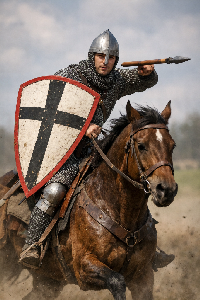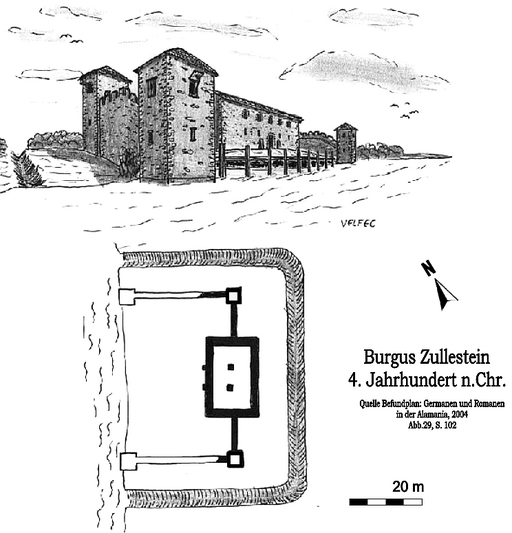|

Norman knight | Anglo Saxon History |  | |
| | Saxon Place Names (bury,borough and burg) |
|---|
My current theory on Saxon Place Names
In 2000 I was looking at the place names around Hastings, which all appear to be Saxon, with a very few exceptions, and
wondered what they meant.
My research lead me to conclude that this area was settled between the take over of Kent by Henghest and Horsa, and the
take over of the South Downs area by Aelle, so around 465AD, and was settled by the Saxons.
If you are interested in this invasion please take a look at The sequence of the Saxon Invasion
As a lot of villages have similar snippets in their name and I wondered if each of these meant something, and that this
in turn might mean that the settlement names described the use or surroundings of a place.
I am not a historian, so until 2026 I had not come across the Gelling-Cole Hypothesis, but this seems to fit well with my
stuff. I have also in 2026 found an academic document written by Dr Robert Higgs from the 'The Journal of Coastal
Research' which discusses sea levels in early Saxon times, this also fits my research.
So what could these snippets mean ??
My conclusions may seem surprising but please read Places containing
the snippet æg meaning island before reading any other snippet pages as this explains the reason for the '4.5 metre
line' described in other snippets.
| | |
|---|
| Definition of bury/borough/burgh ▲ |
|---|
Bury is derived from the Saxon byrig which means a fortified town, probably similar meaning to a burh or
fortified refuge.
Examples of these are:
Canterbury
canter derived from cantwara - the tribe occupying kent pre saxon
bury derived from burh - fortified place, castle - usually associated with old Roman forts
Salisbury
salis derived from salig - willow tree
bury derived from burh - fortified place, castle - usually associated with old Roman forts
Aylesbury
ayles derived from æles - eels
bury derived from burh - fortified place, castle - usually associated with old Roman forts
Next borough, this one is derived from the Roman burgus - a signalling tower
Examples of these are:
Marlborough
marl derived from marl/mærel - a type of limestone/A rope for mooring a ship
borough derived from burgus - a roman signalling tower
Southborough
south derived from suþ - south
borough derived from burgus - a roman signalling tower
Flamborough
flam derived from flan - An arrow, a dart
borough derived from Roman burgus a signalling tower
Finally burgh, this one is more complex as it could refer to one of two different things, the first is the
Roman burgus - a signalling tower, the second the Saxon beorg which means a hill.
Examples of these are:
Drumburgh
drum derived from druim - a ridge
burgh derived from beorg/burgus - a high place - hill/possible roman signalling tower.
(Drumburgh has a Roman fort)
Happisburgh
happis derived from heopes - rose hips
burg derived from beorg/burgus - a high place - hill/possible roman signalling tower
(As far as we know there are no Roman remains in the area so this one means hill)
Burwash
bur derived from beorg/burgus - a high place - hill/possible roman signalling tower
wash derived from æsc/wæsce - ash tree if inland/a place that floods
(As far as we know there are no Roman remains in the area so this one means hill)
| | |
|---|
| A Burgus ▲ |
|---|
Wikipedia Definition:
(Wikipedia Page for more
details)
Burgi were erected along border rivers and along major roads, where they are likely to have been used for observation,
as forward positions or for signalling. So these are larger than the watch towers and usually held a complement of
20-100 men(a century). They are normally defined as 'a small fortified position or watch-tower usually controlling a
main routeway.'
It seems that Castellum also refer to Burgi meaning a larger fortlet, or stone built construction.
Burgus Zullstein illustrated below is a a special type of burgus contained a river landing. In addition to a rectangular
building near the river bank, these had crenellated walls that extended up to or into the river like pincers, thus
protecting a landing stage or berthing bay for cargo ships and river patrol boats.
This may be relevent to our area as we have a location near Rye in Sussex called Cadborough at a strategic
point at the end of the river Brede which is where the majority of the largest Roman iron-workings were.
The modern place name snippet 'Borough' derives from the Roman Burgus, other place names such as
'Burgh' and 'Burg' derive from the Saxon 'Beorg' meaning a hill.
Click on the images for the full Wikipedia image:


| | Further Reading ▲ |
|---|
For further details of types of Roman Fortification:
Roman
Fortifications
For our translation of places named Coldharbour please see:
~~snippet_coldharbour~~
|
|
|
|
|
| |
|
|
Local Interest
Just click an image |
|
|
|
|
|
|
|
|
|
|
|
|
| |
|
|